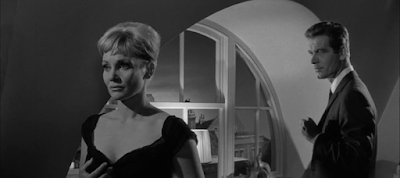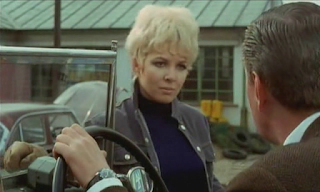The film has elevated production values, with some
glorious shots of the Thames side near Kew at Strand-on-the-Green where a lot
of the action happens although when I say “action” I mean deep pondering set
against the wide-grey waters and a poignant monochrome sky… Boyd is adept a
brooding and carries an energy that suggests he is not only capable of dynamic
action but also destruction and this much we see in one sequence where he
trashes an apartment, accidentally making a small cut on the face of his young
friend, Catherine.
 |
| Pamela Franklin and Stephen Boyd |
The girl herself is fascinating as an actress and a
character; not many teenagers could pull of the emotional conflictions she does and
create the impression of violent damage as well as something deeply hidden… the
“third secret” is one you can hold from yourself.
Catherine’s father, prominent London psychoanalyst Dr.
Leo Whitset, is discovered fatally injured from a gunshot wound and as he dies,
he whispers, "Blame no one but me." It looks like suicide and
the coroner agrees but his closest patients tend to disagree. Boyd plays Alex
Stedman, an investigative TV reporter haunted by demons and drink but still
driven by a need to seek the truth. Catherine and he share a bond and she turns
up at the studios to plead for his help in investigating what she is convinced
is murder.
 |
| Stephen Boyd and Nigel Davenport |
For a dynamic reporter, Alex certainly has a lot of self-doubt
but I guess that’s why he was seeing Dr Whitset, but his need to restore his
friend’s reputation is almost as important as the need to find his killer. Chief
suspects look to be anyone of the Professors’ regular customers which just so
happen to include Alex…
Aside from the angry, unpredictable journalist, there’s Alfred
Price-Gorham (Richard Attenborough) who runs an elite art gallery, Sir
Frederick Belline (the great Jack Hawkins) a high-level judge and Anne Tanner (Diane
Cilento) a nervous secretary completely lacking in self confidence or resilience…The suspects are all impressive enough and what’s
interesting is Alex flawed approach in investigating them. He’s no Sherlock
Holmes even though he’s smart, solving the riddles that Catherine keeps on
chalking on the walls of bankside near her home.
 |
| Richard Attenborough |
At Price-Gorham’s gallery, Alex strikes up an encouraging
conversation with his PA, Miss Humphries (Judi Dench in her first big screen
role, before co-starring in the following year’s Four in the Morning).
Her boss is a frustrated artist and trying to sneak his own work amongst the
more established artists on show. Alex decides he’s an unlikely suspect based
on his fear of elderly and opinionated customers… but you never know, he was
working on a portrait of the professor.
Next Alex takes his “professional” interest in the case
far too far in a one-night stand with the very vulnerable Anne Tanner (Diane
Cilento) … it doesn’t end well and, as with his first interview leads us no
closer to the chief suspect. It serves to show how “vulnerable” Alex is and
how, if anything, he’s just another one of the four main characters who has
lost their therapist.
 |
| Diane Cilento and Mr Boyd |
The same is true of his eventual meeting with Sir
Frederick who, whilst he undoubtedly has many things to hide, is not about to
break down and deliver.
All of which leads us back to the Thames and the word
games and pensive silences between Alex and Catherine… she in search of a
father figure and he, possibly even unsure whether he’s a suspect. It’s a film
that undermines the traditional string male lead and, whilst it meanders, leads
us all down a false trail on purpose.
Dusty verdict: The Third Secret is well directed
by Charles Crichton with some subtly stunning cinematography from Douglas
Slocombe; if it feels less than the sum of its parts that’s possibly because
there’s not enough meat in the character’s motivations outside of their
internal crises. It’s perhaps too introverted for its own good.
The denouement is dramatic and might catch the unwary… it
leaves a feeling of unease, something that could have been more prevalent earlier
for despite itself, the film doesn’t have enough suspense or action.
 |
| Young Judi |
That said, the acting is superb and none more so than
from Pamela Franklin. There’s also a good supporting cast including Rachel
Kempson, Peter Sallis and the ever-superb Nigel Davenport as Alex’s boss! Well
worth seeking out now that it’s on Blu-ray.















































